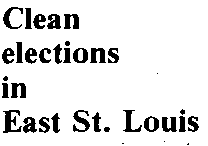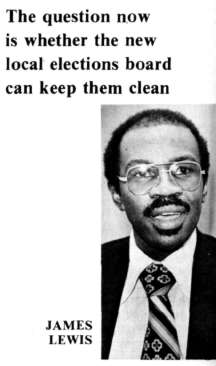
By JIM BRAY
HOLDING a clean election in East St. Louis in recent years has not been an easy task. Outdated registration records, judges ignorant of elementary election laws and election administrators unwilling to reform the process had created an open invitation to vote fraud.
Criticism of the East St. Louis Board of Election Commissioners peaked after the 1977 township elections. The State Board of Elections (SBE) blamed the local board for the existence of "massive election fraud," and the St. Clair County state's attorney later estimated that as many as 10 per cent of the votes may have been stolen.
That was the turning point in the cleanup demanded by citizen groups, ordered by a federal judge and supervised by the SBE. Four convictions obtained in connection with the April 5, 1977, election were the first felony convictions for vote fraud in the history of the county.
A federal lawsuit filed in 1972 by the League of Women Voters (LWV) of St: Clair County spurred the reforms and brought the SBE into the picture. The LWV turned to the federal courts when complaints from LWV poll watchers fell on deaf ears at the East St. Louis Board of Election Commissioners.
A settlement reached early in 1977 mandated changes in the city's election process and required semiannual status reports to the court from the SBE. The first report was a scathing account of the 1977 township elections and the failure of the local board to initiate the reforms called for in the settlement.
The major complaint from the SBE was the refusal by the local board to purge from the registration rolls the names of dead persons and those who had moved from the city. The presence of those names as registered voters made ballot box stuffing a snap.
The report also contended that election judges at the polls could not be expected to halt the vote thefts because their training had been "thoroughly inadequate." Instead of providing judges with state election manuals, the local board distributed a disorganized four-page listing of Election Code provisions. In some instances, according to the SBE, the judges did not even attempt to compare signatures of would-be voters against the signatures on registration records; instead, they accepted the word of party precinct workers.
The local election board staff was hostile to the state officials, refusing to allow the SBE to operate out of the local board's office during election day and turning down an SBE offer to install additional telephone lines to handle the deluge of election complaints and inquiries. As a result, the SBE report characterized the chief clerk of the East St. Louis board as "uncooperative and resentful."
The substance of the SBE charges was later supported in 1978 with the conviction for forgery and perjury of a 19-year-old woman who was found guilty of voting in the name of a 35-year-old woman who had moved to Missouri. Although the conviction is being appealed, prosecutors and state election officials believe the two-year jail term accompanying the vote fraud conviction has served as a deterrent against others. "I suspect that in the past, because nothing had happened to anybody, that they just didn't see it as a very important crime," said St. Clair County State's Attorney Clyde Kuehn.
A one-year jail term was also given to an election judge in that 1977 election. She pleaded guilty to one count of ballot box stuffing and one count of conspiracy to violate the election laws. Kuehn said she had been "the primary engineer of a scheme to steal an estimated 191 votes." Two other election judges pleaded guilty to election law violations, but the terms of the plea negotiations did not call for jail sentences.
Each of the convictions came from Precinct 42 where the dead and missing were listed as residents of vacant buildings and weeded lots. Extensive demolition had reduced the precinct to a ghost town, but the rolls remained full of registered voters, a n easy mark for the unscrupulous.

The SBE estimated that 75 percent of the 405 votes cast in the precinct may have been illegal. After the reforms and publicity of the convictions, only45 t votes were cast from the precinct in the November 1978 general election. "The blatant nature of the fraud made it possible to find the culprit in Precinct
April 1979/Illinois Issues/16
42," Kuehn said. "We had other precincts that had a significant number of votes we knew were fraudulent, but we just didn't know who to hold accountable for it."
The negative report from the SBE, coupled with the indictments, fomented the desire of the LWV to oust the three-member East St. Louis Board of Election Commissioners. In January 1978 the LWV petitioned the circuit judges of the 20th Judicial District, who appoint the election board members. The following month, the circuit judges named a replacement for a member whose term had expired, and the judges completed the sweep with the appointment of two more new members in May.
There was some criticism by East St. Louis residents that the Belleville-based LWV was interfering, but the clean reputations of the three civic leaders named to the election board enabled them to withstand the criticisms. The board now is composed of two women with backgrounds in educational administration and a retired associate circuit court judge.
The new board moved quickly to appoint James Lewis, an East St. Louis native and former member of the Illinois Board of Parole and Pardon, as the new election chief clerk. The board members also welcomed the SBE officials to assist with the April 1978 primary election.
Although there was insufficient time to eradicate the names of dead persons from the voter registration rolls, the new board organized training sessions for judges and brought in a bevy of SBE staff members, law enforcement officers and attorneys from Kuehn's office to assist on election day. Kuehn reported only minor voter infractions during the primary.
After the primary the East St. Louis board authorized a door-to-door canvass in an attempt to eliminate ineligi-bles from the list of registered voters. Precinct committeemen had volunteered to conduct the canvass and then complained that the canvass was unfair when the board decided to use paid and trained workers.
Lewis noted that some politicians had difficulty adjusting to an objective board. "It hasn't been easy down here," Lewis said. "This has been a hot job."
The canvass sliced more than 8,000 names from the original list of 31,695 voters. The registered voters not found or not responding to notices to appear at the election board office were stricken from the list. Lewis acknowledged that some legitimate voters had been removed by mistake, but the few hundred erased in error were allowed to vote by affidavit at the November general election.
Election officials hailed the 1978 general election as one of the cleanest in years and said it was probably run as efficiently as those in cities of similar size elsewhere in the state. The SBE is to end its supervisory role in 1979, and a question remains as to whether the reforms are permanent. "The key now is that the new board members be able to stand on their own two feet and run things by themselves," said Ron Mi-chaelson, executive director of the SBE.
Kuehn said the "supreme test" will be faced in the 1979 city mayoral contest, always a rough and tumble battle with a substantial amount of patronage and the Democratic party leadership at stake. "I tend to think the people manufacturing methods of vote fraud are still there," Kuehn said. "They still know how to do it, which means it could easily fall apart if the board of elections isn't very careful."
Carolyn Chapman, the former LWV president who headed her group's campaign to clean up the system, said the new board is obviously committed to the reforms but needs financial backing by the city and county to further improve the office. "It's going to take awhile before everything is operating properly, but I believe it's on the way," Mrs. Chapman said.
Lewis has consolidated the disorganized filing system and hopes to purchase a word processing machine for updated registration lists. He also hopes to hire a full-time investigator to conduct spot canvassing. If the financially strapped city cannot find the funds for those improvements, Lewis maintains the new board has the dedication to hold honest elections within any budgetary limits. "If this city has a future, it's in this office," said Lewis. "There are a lot of people who just don't vote today because they say their vote doesn't count."
SBE's Michaelson concluded optimistically: "They have made substantial progress. I think the overall attitude, dedication and sincerity that the new board members and the chief clerk have evidenced really shows that there is certainly a great deal of promise."
April 1979/Illinois Issues/17
Illinois Periodicals Online (IPO) is a digital imaging project at the Northern Illinois University Libraries funded by the Illinois State Library
|

